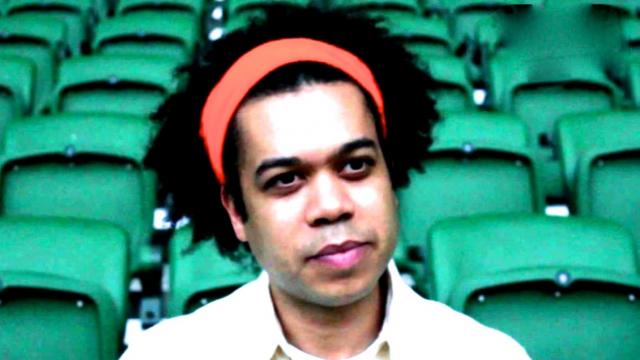
Attracting millions of people to the streets no longer guarantees the success of a protest, says Micah White, 33, the co-creator of Occupy Wall Street.
“Occupy was a perfect example of a social movement that should have worked according to the dominant theories of protest and activism. And yet, it failed,” says Micah in an interview with Folha de São Paulo, the largest daily newspaper in Brazil.
Micah White argues that the use of violence in protests is effective, but only in the short term. And he argues that learning to use social networks to benefit social movements is one of the greatest challenges of activism. “The biggest risk is becoming spectators of our own protests,” he says.
Living in a rural community on the Oregon coast, with about 300 inhabitants, Micah, and his wife Chiara Ricciardone, now run Boutique Activist Consultancy, an activism think tank specializing in impossible campaigns.
Micah was in São Paulo, Brazil on May 26 to participate in the launch event of GUME (“Knife Edge”), an engagement agency founded by Regina Augusto.
Folha de São Paulo: How would you analyze Occupy Wall Street today? What went wrong?
Micah White: This is the big question and of course I've been thinking about it since the end of Occupy. For me, the Occupy movement was a “constructive failure,” which basically means it was a failure that taught us something about activism.
The real benefit of Occupy Wall Street is that it taught us the contemporary ideas and assumptions we have about protests are false. Occupy was a perfect example of how social movements should work. It accorded with the dominant theories of protest and activism: it was a historical event, joined millions of people across demographics from around the world around a series of demands, there was little violence. And yet, the movement failed. So my main conclusion is that activism has been based on a series of false assumptions about what kind of collective behavior creates social change.
F: What are these assumptions?
MW: First, the central idea of contemporary activism: urban protests, with large numbers of people in the streets, primarily secular, and that revolve around a unified demand. The idea is basically, “Look, if we get a million or ten million or a hundred million people in the streets, finally our demands will be met.” However, if you look at the last ten, fifteen years, we have had the biggest demonstrations in history. And the protests continue to grow in size and frequency, and yet they have not resulted in political change.
F: Now what?
MW: What we learned from Occupy, and also with the Arab Spring, is that revolutions happen when people lose their fear. So I think the main trigger for the next revolutionary movement will be a contagious mood that spreads throughout the world and the human community.
For me, the main thing we need to see is activists abandoning a materialistic explanation of revolution – the idea that we need to put people in the streets – and starting to think about how to spread that kind of mood, how to make people see the world in fundamentally different way. That's about it. The future of activism is not about pressing our politicians through synchronized public spectacles.
F: It's not about pressuring politicians?
MW: No. I think the standard forms of protest have become part of the standard pattern. It’s like they are expected. And the key is to constantly innovate the way we protest because otherwise it is as if protest is part of the script. It is now expected to have people in the streets, and these crowds will behave in a certain way, and then the police will come and some of the people will be beaten up and arrested. Then the rest will go home. Our participation in this script is based on the false story that the more people you have in the streets the higher your chances of getting social change.
F: Can you explain better what you're proposing?
MW: What I am proposing is a type of activism that focuses on creating a mental shift in people. Basically an epiphany. In concrete terms, I think there is much potential in the creation of hybrid social movement-political parties that require more complex behaviors of people like running for political office, seeking votes, participating in the city administration.
F: The use of social networks is quite controversial among contemporary activists. Some say it is a key tool to increase the reach of the protests, others say it exposes the movement to monitoring by the authorities. What's your opinion?
MW: This is one of the key challenges. Social media is one of the tools that activists have, and we need to use it in some way. But in fact, social media has a negative side, which goes beyond police monitoring.
During Occupy, we experienced it: things started to look better on social networks than in real life. Then people started to focus on social media and to feel more comfortable posting on Twitter and Facebook than going to an Occupy event. This to me is the biggest risk: to become spectators of our own protests.
F: What do you think of the Black Lives Matter protests that are happening in the United States since last year, the result of racial tension in the country?
MW: Of course I fully support this movement. I am black, I have experienced the discrimination that they are protesting. But thinking strategically, I believe it is very important never to protest directly against the police. Because the police are actually made to absorb protest – the objective of the police is to dissipate your energy in protesting them so you'll let alone the most sensitive parts of the repressive regime in which we live: politicians and big corporations. We must protest more deeply.
F: What do you think of the use of violence in protests?
MW: Studies suggest that protesters who use violence are more effective than those that do not. I think violence is effective, but only in the short term, because you end up developing a kind of organized structure that is easy for police to infiltrate. In the long run, it is much better to develop nonviolent tactics that allow you to create a stable and lasting social movement.
F: But doesn’t violence exclude the public from the movement?
MW: People become alienated and become frightened when they see the black bloc tactic because they do not understand and can not imagine doing it. And movements work when they inspire people, when they are positive, affirmative and make people lose their fear.
It's a difficult balance, because you also do not want to be on the other side and only support forms of activism that are tepid and tedious – you have to find a middle ground that excites people and also leaves them with a little fear. No one really has a remedy to resolve the issue.
F: Your book, The End of Protest, decrees the end of the protest as we know it. Can we reinvent protest?
MW: Protest is reinvented all the time. Every generation experiences its own moments of revolution. The main thing is that we are now living through a time when tactical innovations are happening much more often because people can see what others are doing around the world and innovate in real time.
I think the future of revolution starts with people promising themselves that they will never protest the same way twice. This is very difficult for activists because they like to follow patterns. But when we are committed to innovation, we will invent totally new forms of protest. People did not expect to see something like Occupy when it emerged. And now we do not expect the next big movement...but it will come.
3 WAYS TO SHOW YOUR SUPPORT
- Log in to post comments












